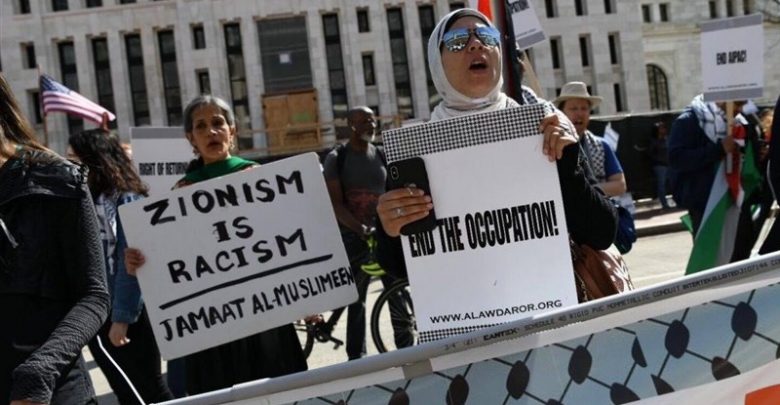Pro-Palestine Protesters Gather outside AIPAC Conference in Show of Defiance
Hundreds of pro-Palestinian demonstrators gathered outside the American Israel Public Affairs Committee (AIPAC) annual conference in Washington, DC, on Sunday in a show of defiance towards the pro-Israel lobby.

Supporters of the Palestinian cause protested outside the annual AIPAC conference that has secured some top US politicians to speak at its three-day event, including Vice President Mike Pence and House Speaker Nancy Pelosi.
The march began at the White House and ended in front of the Washington Convention Center, the venue where the AIPAC conference began that day, News2Share reported.
A number of organizations were behind the protest, including Jewish Voice for Peace, the If Not Now Movement and Al-Awda: the Palestine Right of Return Coalition.
Those present expressed criticism for AIPAC’s influence over US foreign policy in the Middle East, namely lobbying for support of Israel while chanting “Judaism yes! Zionism no! Israel has got to go!”
Israeli Prime Minister Benjamin Netanyahu was scheduled to deliver an address on Tuesday, after meeting with US President Donald Trump, but is said to have to cut short his trip to Washington immediately after meeting Trump.
AIPAC has been consistently protested every year by the Palestinian community but tends to get the support of both Republican and Democrat politicians. While in the 2016 race only Bernie sanders declined to attend, several Democrats running for president in 2020 have declined to attend, which marks a considerable progress for the anti-AIPAC crowd.
The issue is particularly spotlighted given Representative Ilhan Omar’s comments that AIPAC influences American foreign policy because “It’s all about the Benjamins, baby!”
Omar’s comments were popular with protesters Sunday, some of whom quoted her and included her face on their signs.
The event also comes in the aftermath of Trump declaring Golan Heights to be “rightfully owned” by Israel, a decision praised by Netanyahu but condemned by anti-Zionist activists and the world community who see it as Syrian land occupied by Israel.







